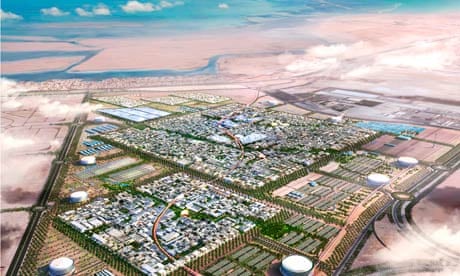Abu Dhabi hosting the World Future Energy conference is like Dracula running a meeting of blood coagulant specialists. Never mind that the emirate has vast oil and gas reserves and is throwing up scandalously inefficient buildings by the score, it really wants to make the world believe that the future will be renewable power.
Money is no object here; not only did Abu Dhabi spend big undisclosed amounts in its campaign to house the proposed International Renewable Energy Agency, the emirate is pumping billions of dollars into Masdar City, billed as the world's first carbon-neutral city. Masdar is also paying for the giant London array offshore windfarm in the Thames estuary and many other clean-tech developments in Europe, Egypt and the US.
Now it has now hooked up with the Massachusetts Institute for Technology (MIT) to attract the world's top scientists and dozens of blue-chip multinationals to roll out the next generation of renewables.
The energy conference is heavily skewed to solar, as you might expect in this region, but its lifeblood is the small-scale entrepreneurs, inventors and technologists who have come to Abu Dhabi hoping to attract cash and become mainstream in 20 years' time.
Here are my top 10 (mostly) small-scale innovating companies on view in Abu Dhabi this week, in no particular rank or order:
1. Jet-stream power
Skymill Energy is a small US/Indian company trying to harness the limitless high-altitude jet-stream winds that blow at over 200mph at over 30,000ft. Others have tried with tethered kites but Skymill think they have cracked the problem by using a remote rotary-lift aerial vehicle, like a helicopter, which is attached to a generator on the ground. The prize is fabulous: vast renewable energy, no pollution, straightforward technology and available materials. Skymill say it could produce power cheaper than coal and are backed by Boeing, former Nasa scientists and Indian technologists. Pilot trials begin in India next year.
2. Plant factories
Korean company Semi-Materials wants to grow vast quantities of food indoors in what could be high-rise factories. The technology needs no soil but uses nutrients and water with LED lighting linked to solar PV power. These minutely controlled environments, it says, would be ideally suited to high-value crops and avoid bacteria, bad weather and viruses. One plant factory is now working, others are planned.
3. Desert soils
Humus Analysis is a small French firm that has grown out of a government research institute. It makes compost from waste products from the oil industry, as well as municipal wastes and claims to be able to build soils which are good enough to grow grass and trees in a year, and edible crops in two years. If employed widely, says the company, it would enable energy profligate Arab states to reduce water use – and therefore energy – significantly. First trials are taking place in Abu Dhabi this year.
4. Micro geothermal
Ritesh Arya is an Indian hydro-geologist who in 2001 found groundwater at over 11,000ft in the Himalayas, the highest that it has ever been discovered. He is backed by three Nordic research groups as well as giant Norwegian oil company Statoil, and is finding geo-thermal resources in places where no-one thought it could be. Thousands of Himalayan communities could benefit from the source of renewable energy.
5. Solar rubbish dumps
African Renewable Energies is a small London–based firm that aims to help poor communities in developing countries earn money and generate electricity from innumerable rubbish tips around African cities. The idea is to cover landfill sites with thinfilm solar phovololtaic cells printed on to the flexible membranes used to cap landfills. Money would be earned from the UN's clean development mechanism and the electricity should last for decades. Trials now taking place in Italy, the US and Nairobi.
6. Waste houses
2G, an emirates company, takes waste palm tree fronds and leaves, mixes in plastics and produces immensely strong floorboards, gates, walls, cladding, roof tiles, decking and other building materials. The raw material is plentiful and free, and the end product is cheaper than wood or plastic. One factory is already built, others expected soon.
7. Air sandwich
New Japanese technology that uses multiple layers of high performance plastic film with air trapped between them to save up to 40% of energy being lost through glass doors or windows. Cheaper and more efficient than most glass double-glazing and good for retrofits.
8. Desert oases
Hitachi is developing small-scale desalination plants that pump brackish water using PV electricity and then cleans it up using reverse osmosis technology. The result is clean water for humans and animals in remote places which would not normally be served by large scale desalination plants. A 40ft container-sized plant can provide enough clean water for 100 people or a waterhole in the desert. Already being used in conservation areas in Abu Dhabi to help oryx and other animals survive.
9. Algae power
Algaeventure is a small US company that has found a cheap way to efficiently separate liquids and solids, bypassing expensive, power-hungry, centrifugal machines. This, they believe, is the key to developing algae as a major source of both food and power in the next 30 years. The company expects algae technology to race ahead in the next 10 years.
10. Solar fridges
Freecold is a small French company specialising in PV-powered solar refrigerators, ideal for off-grid villages, health centres or even remote bars wanting to make ice. It does not need batteries or converters and uses advanced insulation to keep temperatures cool for 75 hours or more.

Comments (…)
Sign in or create your Guardian account to join the discussion